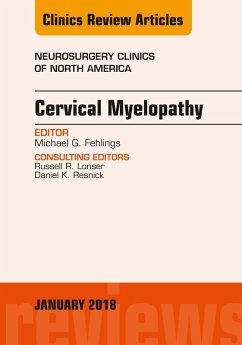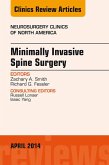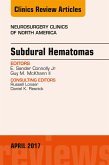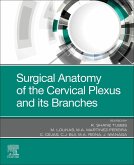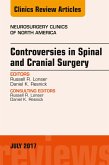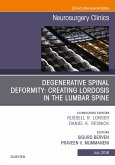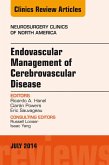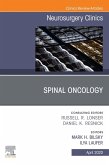Cervical Myelopathy, An Issue of Neurosurgery Clinics of North America (eBook, ePUB)


Alle Infos zum eBook verschenken

Cervical Myelopathy, An Issue of Neurosurgery Clinics of North America (eBook, ePUB)
- Format: ePub
- Merkliste
- Auf die Merkliste
- Bewerten Bewerten
- Teilen
- Produkt teilen
- Produkterinnerung
- Produkterinnerung

Hier können Sie sich einloggen

Bitte loggen Sie sich zunächst in Ihr Kundenkonto ein oder registrieren Sie sich bei bücher.de, um das eBook-Abo tolino select nutzen zu können.
This issue of Neurosurgery Clinics, edited by Dr. Michael G. Fehlings and Dr. Junichi Mizuno, focuses on Cervical Myelopathy. Topics include, but are not limited to, Epidemiology and overview of the clinical spectrum of degenerative cervical myelopathy; Pathobiology of degenerative cervical myelopathy; Natural history of degenerative cervical myelopathy; Imaging evaluation of degenerative cervical myelopathy: current state of the art and future directions; Pathophysiology of CPPD and OYL(OLF); Radiological evaluation of OPLL with dural ossification; Relationship of OALL, OPLL and OYL (OLF);…mehr
- Geräte: eReader
- mit Kopierschutz
- eBook Hilfe
- Größe: 36.88MB
![Minimally Invasive Spine Surgery, An Issue of Neurosurgery Clinics of North America (eBook, ePUB) Minimally Invasive Spine Surgery, An Issue of Neurosurgery Clinics of North America (eBook, ePUB)]() Richard G FesslerMinimally Invasive Spine Surgery, An Issue of Neurosurgery Clinics of North America (eBook, ePUB)63,95 €
Richard G FesslerMinimally Invasive Spine Surgery, An Issue of Neurosurgery Clinics of North America (eBook, ePUB)63,95 €![Subdural Hematomas, An Issue of Neurosurgery Clinics of North America (eBook, ePUB) Subdural Hematomas, An Issue of Neurosurgery Clinics of North America (eBook, ePUB)]() E. Sander ConnollySubdural Hematomas, An Issue of Neurosurgery Clinics of North America (eBook, ePUB)81,95 €
E. Sander ConnollySubdural Hematomas, An Issue of Neurosurgery Clinics of North America (eBook, ePUB)81,95 €![Surgical Anatomy of the Cervical Plexus and its Branches - E- Book (eBook, ePUB) Surgical Anatomy of the Cervical Plexus and its Branches - E- Book (eBook, ePUB)]() Surgical Anatomy of the Cervical Plexus and its Branches - E- Book (eBook, ePUB)78,95 €
Surgical Anatomy of the Cervical Plexus and its Branches - E- Book (eBook, ePUB)78,95 €![Controversies in Spinal and Cranial Surgery, An Issue of Neurosurgery Clinics of North America (eBook, ePUB) Controversies in Spinal and Cranial Surgery, An Issue of Neurosurgery Clinics of North America (eBook, ePUB)]() Russell R. LonserControversies in Spinal and Cranial Surgery, An Issue of Neurosurgery Clinics of North America (eBook, ePUB)81,95 €
Russell R. LonserControversies in Spinal and Cranial Surgery, An Issue of Neurosurgery Clinics of North America (eBook, ePUB)81,95 €![Degenerative Spinal Deformity: Creating Lordosis in the Lumbar Spine, An Issue of Neurosurgery Clinics of North America (eBook, ePUB) Degenerative Spinal Deformity: Creating Lordosis in the Lumbar Spine, An Issue of Neurosurgery Clinics of North America (eBook, ePUB)]() Sigurd H. BervenDegenerative Spinal Deformity: Creating Lordosis in the Lumbar Spine, An Issue of Neurosurgery Clinics of North America (eBook, ePUB)81,95 €
Sigurd H. BervenDegenerative Spinal Deformity: Creating Lordosis in the Lumbar Spine, An Issue of Neurosurgery Clinics of North America (eBook, ePUB)81,95 €![Endovascular Management of Cerebrovascular Disease, An Issue of Neurosurgery Clinics of North America (eBook, ePUB) Endovascular Management of Cerebrovascular Disease, An Issue of Neurosurgery Clinics of North America (eBook, ePUB)]() Ricardo A. HanelEndovascular Management of Cerebrovascular Disease, An Issue of Neurosurgery Clinics of North America (eBook, ePUB)48,95 €
Ricardo A. HanelEndovascular Management of Cerebrovascular Disease, An Issue of Neurosurgery Clinics of North America (eBook, ePUB)48,95 €![Spinal Oncology An Issue of Neurosurgery Clinics of North America (eBook, ePUB) Spinal Oncology An Issue of Neurosurgery Clinics of North America (eBook, ePUB)]() Spinal Oncology An Issue of Neurosurgery Clinics of North America (eBook, ePUB)76,95 €
Spinal Oncology An Issue of Neurosurgery Clinics of North America (eBook, ePUB)76,95 €-
-
-
Dieser Download kann aus rechtlichen Gründen nur mit Rechnungsadresse in A, B, BG, CY, CZ, D, DK, EW, E, FIN, F, GR, HR, H, IRL, I, LT, L, LR, M, NL, PL, P, R, S, SLO, SK ausgeliefert werden.
- Produktdetails
- Verlag: Elsevier HealthScience EN
- Erscheinungstermin: 1. Dezember 2017
- Englisch
- ISBN-13: 9780323570664
- Artikelnr.: 50418386
- Verlag: Elsevier HealthScience EN
- Erscheinungstermin: 1. Dezember 2017
- Englisch
- ISBN-13: 9780323570664
- Artikelnr.: 50418386
Cervical Myelopathy
Preface: Current Knowledge in Degenerative Cervical Myelopathy
Epidemiology and Overview of the Clinical Spectrum of Degenerative Cervical
Myelopathy
Pathobiology of Degenerative Cervical Myelopathy
The Natural History of Degenerative Cervical Myelopathy
Imaging Evaluation of Degenerative Cervical Myelopathy: Current State of
the Art
and Future Directions
Pathophysiology of Calcification and Ossification of the Ligamentum Flavum
in the Cervical Spine
Radiologic Evaluation of Ossification of the Posterior Longitudinal
Ligament with Dural Ossification
Ossification of the Ligaments in the Cervical Spine, Including Ossification
of the Anterior Longitudinal Ligament, Ossification of the Posterior
Longitudinal Ligament, and Ossification of the Ligamentum Flavum
Importance of Sagittal Alignment of the Cervical Spine in the Management of
Degenerative Cervical Myelopathy
Anterior Cervical Option to Manage Degenerative Cervical Myelopathy
Laminectomy with or Without Fusion to Manage Degenerative Cervical
Myelopathy
History and Evolution of Laminoplasty
Significant Predictors of Outcome Following Surgery for the Treatment of
Degenerative Cervical Myelopathy: A Systematic Review of the Literature
Neurologic Complications in Managing Degenerative Cervical Myelopathy:
Pathogenesis, Prevention, and Management
Options of Management of the Patient with Mild Degenerative Cervical
Myelopathy
Management of the Patient with Cervical Cord Compression but no Evidence of
Myelopathy: What Should We do?
Clinical Characteristics and Management of C3-4 Degenerative Cervical
Myelopathy
Intraoperative Neurophysiologic Monitoring for Degenerative Cervical
Myelopathy
Health Economics and the Management of Degenerative Cervical Myelopathy
Managing the Complex Patient with Degenerative Cervical Myelopathy: How to
Handle the Aging Spine, the Obese Patient, and Individuals with Medical
Comorbidities
Future Directions and New Technologies for the Management of Degenerative
Cervical Myelopathy
Cervical Myelopathy
Preface: Current Knowledge in Degenerative Cervical Myelopathy
Epidemiology and Overview of the Clinical Spectrum of Degenerative Cervical
Myelopathy
Pathobiology of Degenerative Cervical Myelopathy
The Natural History of Degenerative Cervical Myelopathy
Imaging Evaluation of Degenerative Cervical Myelopathy: Current State of
the Art
and Future Directions
Pathophysiology of Calcification and Ossification of the Ligamentum Flavum
in the Cervical Spine
Radiologic Evaluation of Ossification of the Posterior Longitudinal
Ligament with Dural Ossification
Ossification of the Ligaments in the Cervical Spine, Including Ossification
of the Anterior Longitudinal Ligament, Ossification of the Posterior
Longitudinal Ligament, and Ossification of the Ligamentum Flavum
Importance of Sagittal Alignment of the Cervical Spine in the Management of
Degenerative Cervical Myelopathy
Anterior Cervical Option to Manage Degenerative Cervical Myelopathy
Laminectomy with or Without Fusion to Manage Degenerative Cervical
Myelopathy
History and Evolution of Laminoplasty
Significant Predictors of Outcome Following Surgery for the Treatment of
Degenerative Cervical Myelopathy: A Systematic Review of the Literature
Neurologic Complications in Managing Degenerative Cervical Myelopathy:
Pathogenesis, Prevention, and Management
Options of Management of the Patient with Mild Degenerative Cervical
Myelopathy
Management of the Patient with Cervical Cord Compression but no Evidence of
Myelopathy: What Should We do?
Clinical Characteristics and Management of C3-4 Degenerative Cervical
Myelopathy
Intraoperative Neurophysiologic Monitoring for Degenerative Cervical
Myelopathy
Health Economics and the Management of Degenerative Cervical Myelopathy
Managing the Complex Patient with Degenerative Cervical Myelopathy: How to
Handle the Aging Spine, the Obese Patient, and Individuals with Medical
Comorbidities
Future Directions and New Technologies for the Management of Degenerative
Cervical Myelopathy
